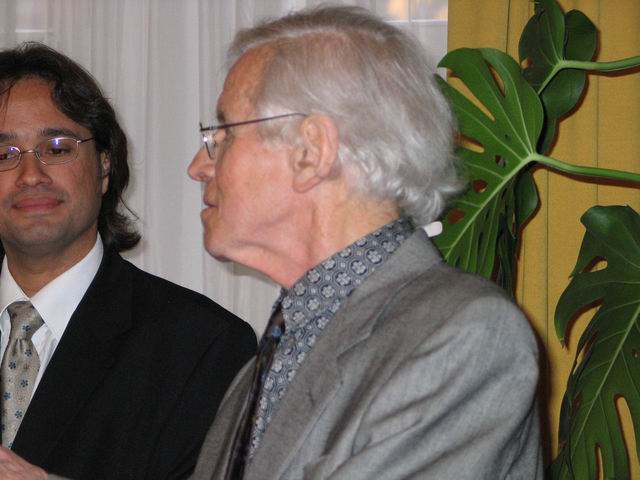Colin Cooper (left - with
Gabriel Guillén)
(Colin Cooper is a longstanding member of the Jury of the John
Duarte Competition of the International Guitarfestival Rust.
He is also president of the jury.
Interview with Colin Cooper:
Question: Who do you think is
the most overrated and the most
underrated composer for the
classical guitar?
Colin Cooper:
Most overrated: the composer who
wrote La Catedral.
Most underrated: the composer who
wrote Sueño en la Floresta, Caazapá
and much other music of the purest
poetry.
....
Question: Which „Slogan“
would you use in advertising for the
classical guitar?
Colin Cooper:
The guitar reaches parts of the body
that other instruments cannot reach.
....
Question: With which
prejudices – that are connected with
the classical guitar – would you
like to get rid of?
Colin Cooper:
With which prejudices that are
connected with the classical guitar
would you like to get rid of?
Answer: The prejudiced belief that
it is a quiet instrument, with more
charm than passion. It is not a
quiet instrument; it is just not so
loud as most other instruments. And
it can have quite enough passion in
the hands of a player who is also a
committed musician. Unfortunately
for the guitar's reputation, it is
the charm of the instrument that is
its most apparent quality, and which
attracts people. Only the composers
can rectify the balance.
....
Question: Which attributes do
you find typical for classical
guitarists?
Colin Cooper:
Classical guitarists are like
humanity in general: they come in
all sizes, all dispositions, all
temperaments. Possibly too many of
them settle too easily into a life
of teaching, occasional performance
and regular appearances at festivals.
I would like to see more good
players determined to take the
guitar into the outside world and to
make more converts there.
....
Question: What things in your
life do you definitely want to learn
and what do you regret not having
done?
Colin Cooper:
1. To learn to play the piano better.
2. I regret: Not having studied
composition when I was younger. Not
being able to afford a small pipe
organ. Not having enough money to
take up ocean yacht racing.
....
Question: What dreams do you
have that you would like to fulfil?
Colin Cooper:
To stay alive until I have finished
my work and my studies. I estimate
that it will take another 220 years.
.....
Question: What is
embarrassing for you?
Colin Cooper:
The most embarrassing of all is too
embarrassing even to think about,
much less write down. However, I can
say that when I was a small child I
used to lie awake listening to my
mother playing the piano and singing.
Even now, when I hear the harmonies
of that not-very-complex music, I am
overcome with emotion and cannot
speak. It can be embarrasssing if
other people are present. The writer
D.H. Lawrence described in a poem
how he used to sit at the feet of
his mother as she played and sang at
the piano - which of course is an
instrument every family had in those
days. His poem ends:
So now it is vain for the singer to
burst into clamour
With the great black piano
appassionato. The glamour
Of childish days is upon me, my
manhood is cast
Down in the flood of remembrance, I
weep like a child for the past.
......
Question: What short phrase
would you use to discribe your lifes
philosophy?
Colin Cooper:
Life is a holiday from the
dark: you'd better enjoy it.
.....
Question: Which abuse in your
native country would you like to do
away with?
Colin Cooper:
The political belief that when money
for education has to be reduced,
music must be the first subject to
suffer - because music is not a 'useful'
subject. This idea was popular in
government circles in the 1960s. The
'white-hot technical revolution' of
Harold Wilson's government began the
nonsense. British universities
stressed the importance of the
sciences at the expense of the arts.
Nowadays, when you talk to a
professor of physics or organic
chemistry, you soon discover that he
or she knows nothing about music. It
never used to be the case.
Prime Minister Thatcher completed
the disaster when she withdrew music
from the schools curriculum. When my
sons went to secondary school, they
could choose which instrument they
wanted to study from the school's
stock. Having made their choice,
they received one free lesson a week.
Thatcher stopped all that, with the
result that learning to play a
musical instrument, even on a basic
level, has become exclusive to
families rich enough to afford to
pay for extra lessons. The result is
that a large amount of undiscovered
musical talent goes to waste. This
is the legacy of the much-admired
'Iron Lady'.
....
Question: In relation to
world history, which personalities
fascinate you the most?
Colin Cooper:
1. The emperor Nero, who had the
instincts of a musician but not the
equipment, like so many guitarists.
But Nero won 300 music competitions
in a single visit to Greece: he must
have had a talent of some sort!
2. Hector Berlioz, who produced the
monumental Treatise on
Instrumentation, but could play only
one instrument: the guitar. It was
enough.
3. Samuel Taylor Coleridge, a great
English poet (1772-1834). He took
opium to heighten his perceptions.
It shortened his life, but at his
best he could produce the purest
music in words.
In Xanadu did Kubla Khan
A stately pleasure-dome decree;
Where Alph, the sacred river, ran
Through caverns measureless to man
Down to a sunless sea.
Perhaps you have to be English to
experience the music of those last
three lines. They grip me as a
phrase in a Mozart string quintet
does, a piece of art that cuts right
through to the inner person,
something that cannot be improved
on. Perfection is one of the deepest
human emotions.
Coleridge produced this wonderful
stuff while living in a little
cottage in the West of England, very
close to where I lived more than a
hundred years later.
.....
Question: Which question would
you like to be asked and what is
your answer to this
question?
Colin Cooper:
The question: why did you, a
professional writer with a good
track record in plays performed (12,
including a prize-winning television
drama), novels published (5),
scripts for BBC drama and much other
miscellaneous writing, give it all
up to spend 25 years editing a
magazine about the classical guitar
that hardly anyone wants to buy?
I like to be asked this question,
because I still don’t know the
answer. One day I hope to know it,
and naturally I want someone to ask
me about it.
....
Question: Which guitar
virtuoso today has the makings to
follow in the footsteps of Andres
Segovia?
Colin Cooper:
Segovia left large footprints, but
they lead in a direction that is no
longer of much musical significance.
What modern guitarist would want to
play to an audience of 3000 without
amplification? Who could offer
today's audiences arrangements of
Haydn minuets and Bach gavottes
isolated from the works of which
they form a structural part? And who
would dare to play them in the style
that Segovia did?
Nevertheless, there is room for a
large personality to leave his mark
on the guitar world, as Liszt did
with the piano, but I don't see one
at the moment.
=====
Thank you very much Colin for this interview.
Jovan Pesec
a service of

updated:
07. February 2007
designed by
Judith.P.Fischer
